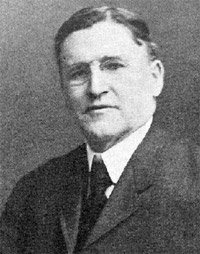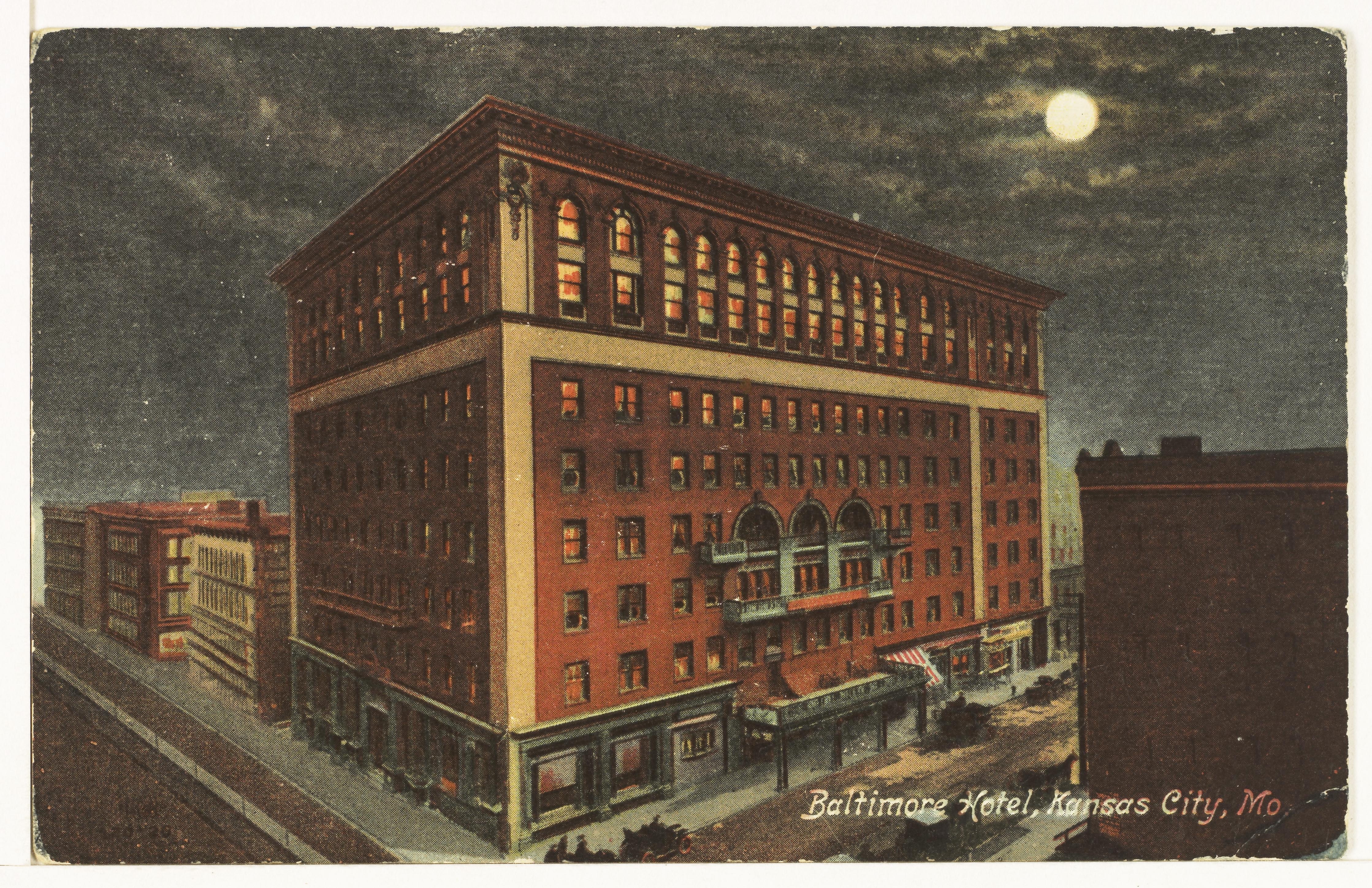On March 31, 1882, The Kansas City Star declared its opposition to the streetcar monopoly then held by Thomas Corrigan. Although William Rockhill Nelson, owner of The Star, generally preferred that the paper remain neutral in politics, he made exceptions for cases where he believed rampant corruption demanded public awareness. Nelson's ensuing battle with the Corrigan family emerged as one of the defining contests of local Kansas City politics in the late-nineteenth century.
Thomas Corrigan, along with brothers Bernard, Edward, and Patrick, arrived in Kansas City in 1868 to find a young metropolis that lacked basic infrastructures, especially roads. The "Corrigan boys," as they soon became known, quickly developed a contracting business that carved traversable roads into the steep hills on which the city was built. By 1875, the Corrigan Consolidated Street Railway Company operated almost all of the city's mule-drawn streetcars, and Bernard Corrigan held the position of police commissioner. Thomas Corrigan also had close ties to the city's most successful bank, the Armour bank. Those influences, combined with the loyalty of their own employees, ensured that the Corrigans could sway hundreds of votes in city elections. In less than a decade since they arrived in the city, the Corrigans presided over Kansas City's first political "machine."

The Corrigans tested their influence in 1882 when they convinced the city government to block a competing company from entering the city. Believing that the blocked companies would have upgraded from mule-drawn streetcars to cable cars, Nelson, who had founded The Star just one year earlier, seized the opportunity to oppose the monopolistic practices of the Corrigans. The newspaper's circulation conveniently increased in the process. An editorial on March 31 summarized Nelson's view "that competition is necessary for the protection of the public."
Two years later in 1884, The Star's opposition paid dividends. The Corrigans proposed a guaranteed franchise extension that would have protected their horse-drawn lines from competition for 30 years. Bowing to public protest led by The Star, the mayor vetoed the legislation. The Corrigans subsequently sold what was left of their streetcar business to the Metropolitan Street Railway, which went on to develop Kansas City's cable car system into the nation's third largest.
Nelson's victory did not defeat the Corrigans outright. Thomas Corrigan turned his focus to real estate development and the construction of railroad lines until his death in 1894. From 1894 until 1896, Bernard Corrigan oversaw the completion of the Hotel Baltimore, which gained renown for its size and splendor that rivaled even the finest hotels in New York City.
Meanwhile, The Star continued to campaign for improvements to the streetcar lines, better business practices, and even public ownership of the lines. From 1882 to 1915, The Star printed more than 2,500 articles about streetcars. In most of these matters, Nelson did not accomplish his goals, but he was soon successful in a final confrontation with the Corrigans.
Bernard Corrigan had delved back into the streetcar business when he became president of the Metropolitan Street Railway in 1902. In 1909, he once again attempted to negotiate a monopolistic franchise contract with the city, but this time for a period of 42 years. This proposal reignited opposition under the leadership of The Star, and once again Nelson prevailed. Four years later, Bernard Corrigan passed away, and the Corrigan family began a gradual shift into relative obscurity.
Read biographical sketches and building profiles related to the Corrigan monopoly, prepared for the Missouri Valley Special Collections, The Kansas City Public Library.
- Biography of Bernard Corrigan (1847-1914), railroad magnate, by Daniel Coleman
- Profile of the Baltimore Hotel, constructed by Thomas and Bernard Corrigan, by Donna Francis
- Biography of Louis Curtiss (1865-1924), architect and designer of the Bernard Corrigan residence in 1912, by Susan Jezak Ford
- Biography of Charles F. Morse (1839-1926), businessman and civic leader, one-time president of the Metropolitan Street Railway Company, by David Conrads
View images relating to the Corrigan family and William Rockhill Nelson that are a part of the Missouri Valley Special Collections.
- Bernard Corrigan Residence; constructed for Bernard Corrigan but not completed before his death
- William Rockhill Nelson Residence, "Oak Hall"
- Streetcars of the Metropolitan Street Railway Company in front of the post office
- Baltimore Hotel with brief description; constructed in 1898-1899 by Thomas and Bernard Corrigan
- Postcard of Baltimore Hotel, 11th Street entrance at night
- Postcard of the Cathedral of the Immaculate Conception; Mrs. Thomas Corrigan donated its carillon bells
Check out the following books and articles about the Corrigan family and William Rockhill Nelson.
- A Splendid Ride: The Streetcars of Kansas City, 1870-1957, by Monroe Dodd; contains multiple references to the Corrigan streetcar monopoly, especially pp. 3-9
- From the Bottom Up: The Story of the Irish in Kansas City, by Pat O'Neill; contains information on the Corrigan streetcar monopoly, pp. 58, 94-98, 130, 149
- Houses of Missouri, 1870–1940, by Cydney Millstein and Carol Grove; profile of the Bernard Corrigan residence, pp. 134-139
- Historic Kansas City Architecture, by the Landmarks Commission of Kansas City; contains information about the Bernard Corrigan house, page 20
- "Corrigan Mansion in National Register," Historic Kansas City News, by Edward J. Miszczuk
- Boss Busters & Sin Hounds: Kansas City and its Star, by Harry Haskell; a comprehensive history of The Kansas City Star
- William Rockhill Nelson: The Story of a Man, A Newspaper, and a City, written by staff of The Kansas City Star in 1915; a dated, but useful biography of Nelson
Continue researching the Corrigan family using archival material held by the Missouri Valley Special Collections.
- Vertical File: Corrigan, Bernard
- Vertical File: Buildings, Corrigan
- Horse Railroad City Directory Entries; listings for the four horse railroads in operation in 1881
- Vertical File: Middaugh, Loren Grant; designer of "the Corrigan house" at 17th and Summit streets
- Vertical File: Street Railways
- Obituary for Richard Corrigan, 1959, son of Bernard Corrigan
- Obituary for Bernard Corrigan, Jr. (1881-1907), third son of Bernard Corrigan, Sr.
- "Early Concrete Construction in Kansas City," Skylines, 1965; profiles early concrete structures in KC, including the Bernard Corrigan residence
- Photo of Bernard Corrigan (1847-1914), The Kansas City Journal
References:
Coleman, Daniel. "Biography of Bernard Corrigan (1847-1914), Railroad Magnate," Missouri Valley Special Collections, 2008.
Francis, Donna. "Profile of the Baltimore Hotel," Missouri Valley Special Collections, 1999.
Haskell, Harry. Boss Busters & Sin Hounds: Kansas City and Its Star. Columbia: University of Missouri Press, 2007.
Schirmer, Sherry Lamb. At the River's Bend: an Illustrated History of Kansas City: Independence and Jackson County. Woodland Hills, CA: Windsor Publications, 1982.
William Rockhill Nelson: The Story of a Man, A Newspaper, and a City. Cambridge, MA: The Riverside Press, 1915.


